Thinking about the nature of truth helps us understand how the Bible is (and is not) true.
And don’t get nervous … I believe all the Bible is true … but you need to read on to discover what I mean by this.
Beginning with Truth
There are different types of truth.
There is logical truth, scientific truth, historical truth, relational truth, poetic truth, and yes, even universal truth. There is a lot of overlap between some of these types of truth, but there are also some areas that might be true in one category, but not true in another.
Various Types of Truth Claims

For example, the statement “2+2=4” is mathematically true, while the statement “I love my wife” is relationally true. But I cannot use mathematics to defend the truth that I love my wife, so the statement “I love my wife” is not mathematically true.
Then there are statements which are true for some and not true for others. The statement, “Halloween is a day on which children get candy,” is true for children who go Trick-or-Treating on Halloween, but is not true for those who don’t.
Many historical truth claims are true when they are made, but are not true later. For example, “King George is the King of England” was true when he was king, but is no longer true today.
Then there are experiential truths and truths from a certain perspective. Consider these two statements: “The sun rises in the east. The sun rises in the west.” Which statement is true? Everybody would agree that first statement is true. Yet from a scientific perspective, the sun does not rise in the east. This is an illusion based on our experience of seeing the sun rise up out of the Eastern horizon. Scientifically, however, the sun is stationary and the earth rotates around the sun.
Of course, even that is not a scientifically true statement, since in reality, the sun is not even close to stationary. The sun it is moving through the Milky Way galaxy at a speed of 450,000 mph. And when you consider that the Milky Way galaxy is moving toward the Andromeda galaxy at a speed of about 150,000 mph, and the earth is moving around the sun at a speed of about 70,000 mph, what this means is that when you were a child and your mother told you to “Sit still” you were still moving at a rate of about 670,000 mph.
So as you sit there reading this text, are you sitting still or are you moving?
You might say, “Well, I’m sitting still relative to my chair, but not sitting still relative to the universe.” Fine. Except that even relative to your chair, you are not sitting still. For the word “still” means “absent of all movement.” Yet your blood is moving, your eyes are blinking, your cells are reproducing, and your molecules are vibrating around like crazy. You are not remotely “still.” So you see? The truth claim that you are sitting still relative to your chair requires even further clarification to be truly true.
This dilemma about truth becomes even more convoluted when we begin to discuss history, poetry, and literature.
The statement, “I ate porridge for breakfast this morning,” is a true statement (Relative, of course, to how I am using the words “porridge” and “morning.”) But if I say, “The porridge was good,” we now have a truth dilemma. What do I mean by “good”? I could mean that it tasted good, or that it was morally good, or that it was not rotten, or maybe that it manufactured and sold by a company named “Good.”
And what about the statement, “I will eat porridge next Monday morning?” It is my plan to eat porridge next Monday, but does this plan make the statement true today? In other words, can a statement about the future be true?
Then there is the language of poetry. Take this statement: “The color of love is red?” Is that true? Yes, it is true. But not from a scientific, or logical, or mathematical, or historical perspective. Love has no color. And in fact, what exactly is “red”? For that matter, what is “love”? (Baby, don’t hurt me, don’t hurt me, no more!)
Or take fiction and literature as an example. Here is a True or False question for you to answer: Aesop’s Fables are true.
Well, of course they’re false! In fact, the word “fable” means “myth” or fictional story, which by definition, means they are not true.
And yet Aesop’s Fables contains some of the greatest truths in literature. Truths about greed, teamwork, hard work, and self-discipline. So in this sense, Aesop’s Fables are amazingly true.
Enough with all this though. I hope you see that the truthfulness of a statement depends almost entirely on the type of truth statement it is, the context in which it is said, and numerous other factors.
So what about the truthfulness of the Bible?
The discussion above is why it is so difficult for some people to answer the question, “Is the Bible true?” Is that question referring to scientific truth, historical truth, relational truth, mathematical truth, poetic truth, or some other type of truth?
Initially, the answer to all these questions seems to be “Yes.” Many would state that “No matter what type of proposition or claim the Bible is making, it is true.”

Okay, let’s consider a few examples.
Earlier in this post, we talked about mathematical and scientific truth claims in the Bible.
In my One Verse Podcast, we have been looking at some of the claims in Genesis 1 (which some people believe are scientific truth claims … but I don’t). In Genesis 1:6, we read that God placed a firmament in the sky to separate the waters above from the waters below.
As I pointed out in the podcast, the word “firmament” means a hard dome. So is it true that there is a hard dome up in the sky which holds back a heavenly ocean from falling upon us?
Well, no, this isn’t true.
Ah, so then the Bible has errors?
I do not believe so (as I explain the Podcast). While Genesis 1:6 may not be scientifically true, there are other ways that a statement can be true. The key is figuring out how Genesis 1:6 is true.
Take the truth claim of the Bible that “God is love.” Is that true? Well, of course it’s true. But it is not mathematically or scientifically true. It is relationally true. It is a statement about God’s character and nature.
Or what about the numerous statement in the Psalms about how God looks and acts? I just randomly opened to the Psalms and found the statement in Psalm 68:4 that God rides on the clouds. Is this true? If you look up at the clouds and see them moving across the sky, is God up there riding across the sky on the clouds like a person rides a horse? Or maybe God is into cloud surfing the way people surf waves?
No, of course not. Psalm 68:4 is poetically true, describing the glory and majesty and power of God.
Or how about the parables of Jesus? Are they true?
Well, of course they are true!
But was there really a landowner who went away and when he sent back servants to receive the income from the land, the tenants of the land killed all the servants? And so the landowner finally sent his son, thinking the tenants would listen to him, but instead, the tenants killed the son as well? Did that really happen? Maybe … but its highly unlikely, and the reason Jesus told this parable, was not to teach a historical truth, but to teach a theological and relational truth about his own mission and ministry.
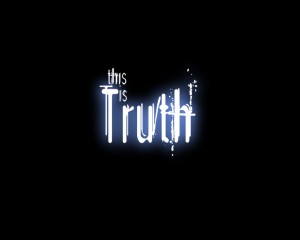 Or take prophecy. Are prophetical statements about future events true? Well, they do reveal divine intent, and since God can bring about what He intends, we could say that prophetical statement are more true than the statements about any human intent, but again, are statement about future historical events actually true before they occur?
Or take prophecy. Are prophetical statements about future events true? Well, they do reveal divine intent, and since God can bring about what He intends, we could say that prophetical statement are more true than the statements about any human intent, but again, are statement about future historical events actually true before they occur?
We could go on and on, but here’s the point:
The question is not “Is the Bible true?” but rather, “How is the Bible true?”
Asking that second question is key in properly studying and understanding the Bible.
This sort of approach to Scripture allows us to take a more nuanced view of the doctrine of inerrancy.
I Believe in Inerrancy
Biblical Inerrancy is loosely defined as the idea that the Bible is without error. That everything on which it speaks, it speaks truly.
I agree with this.
I believe the Bible is true. I believe every word of it is true.
And in fact, I am going to go further than most inerrantists I know. I believe the Bible is more true than most of them believe.
Most inerrantists qualify their belief in the truth of the Bible by saying that the Bible is without error in the original manuscripts. That is, most inerrantists only believe the original manuscripts of the Bible are inerrant. They freely admit that the manuscripts which we have now are full of errors.
But I do not qualify my belief in the truth of Scripture this way at all. Because of how I understand truth, I believe the Bible is true more than inerrantists do.
While I do believe that the original manuscripts were completely true, I also believe that the copies of these original manuscripts are completely true, and I believe that all translations and Bible versions are completely true, including not only the KJV, but also the NIV, the NASB, the Message, the Living Bible, and even translations into Swahili or Klingon. Yes, did you know there is a Klingon version of the Bible? There is. And I believe it is true.
I know these sorts of statement will make people mad, but here’s the thing: I believe that these debates about who truly believes the Bible and who doesn’t are just the smoke and mirrors of religion.
Debates About Inerrancy are Debates for Control
Debates about inerrancy are nothing more than ways for one particular group of religious leaders to manipulate and control their followers into submission and to keep them from listening to the ideas or teachings of another group of religious leaders — who, incidentally, use the same arguments to control and manipulate their followers to keep them from listening to the first group!
It is a powerful argument in the minds of many to be able to say, “I am right and those people over there are wrong because they don’t believe the Bible, and so you better listen to me.” But every time I hear this sort of language coming out of a teacher or a ministry, I run away faster than I would run from a roaring lion.
But if my understanding of what the Bible says is different than your understanding of what the Bible says, you cannot say that I don’t believe the Bible is true, for I do. I simply believe that the Bible is true in a different way than you believe it is true, and I believe that the truth claims it makes are different than the truth claims you believe it makes.
The claim, “You don’t believe the Bible is true” is nothing more than a smokescreen put up by manipulative religion to discredit or ignore a challenging teaching or idea about the Bible which disagrees or contradicts what that religion teaches. This accusation is played as a trump card, but it turns out to be nothing more than a joker.
But if we can stop arguing about inerrancy, we can return instead to what has true value, which is actually discussing the biblical text itself. We can talk about how a passage is true, even if we know it is not scientifically or historically true.
Does this way of thinking help you know that you can trust Scripture as true? I hope so. Let me know your thoughts and questions in the comments below.



![[#09] Genesis 1:11-12 – Was there Death before the Fall?](https://redeeminggod.com/wp-content/uploads/2015/09/One-Verse-Podcast-Jeremy-Myers-150x150.jpg)




 He already carried His cross. He doesn’t need or want or call us to carry His cross. Jesus carried His cross so that we would not have to. (Yes, yes, Simon carried it for him for a while, but when we talk about Jesus carrying His cross, we’re not actually talking about Him carrying it, but about His death and suffering upon the cross…)
He already carried His cross. He doesn’t need or want or call us to carry His cross. Jesus carried His cross so that we would not have to. (Yes, yes, Simon carried it for him for a while, but when we talk about Jesus carrying His cross, we’re not actually talking about Him carrying it, but about His death and suffering upon the cross…) Yes, in this world, you will have troubles (John 16:33). But that is because this world is full of troubles. Jesus didn’t want you to think that by following Him, you would escape all troubles. No, you will still have troubles, but you can bear them with the knowledge that they will lead to opportunities to glorify God and serve others.
Yes, in this world, you will have troubles (John 16:33). But that is because this world is full of troubles. Jesus didn’t want you to think that by following Him, you would escape all troubles. No, you will still have troubles, but you can bear them with the knowledge that they will lead to opportunities to glorify God and serve others.




 The sections I most often feel uneasy about after a night’s sleep are the sections where I am trying to manipulate and control people with guilt, fear, or shame. They are the sections that sound judgmental. They are the sections that were included to boost my ego and pride.
The sections I most often feel uneasy about after a night’s sleep are the sections where I am trying to manipulate and control people with guilt, fear, or shame. They are the sections that sound judgmental. They are the sections that were included to boost my ego and pride.


 This sort of makes God like Freddy Krueger, except that He carves up His own Son.
This sort of makes God like Freddy Krueger, except that He carves up His own Son. God has redeemed the crucifixion so that we now sing songs about it and listen to sermons about the horrible death of an innocent victim with smiles on our faces. But this doesn’t make the crucifixion “good.” It only reveals God’s ability to redeem anything and everything.
God has redeemed the crucifixion so that we now sing songs about it and listen to sermons about the horrible death of an innocent victim with smiles on our faces. But this doesn’t make the crucifixion “good.” It only reveals God’s ability to redeem anything and everything. 
 And yet … let’s be honest … saying that “everything came from God” only pushes the logical causality of everything further back one step. If I have trouble believing that everything came from nothing, and so say that everything came from God, the question is then, “Well then, where did God come from?” The Christian answer is that He didn’t come from anything; He just always was.
And yet … let’s be honest … saying that “everything came from God” only pushes the logical causality of everything further back one step. If I have trouble believing that everything came from nothing, and so say that everything came from God, the question is then, “Well then, where did God come from?” The Christian answer is that He didn’t come from anything; He just always was.

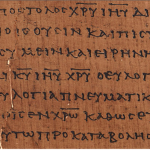
 Kregel Publications recently sent me a review copy of Philip Wesley Comfort’s new study resource, A Commentary on the Manuscripts and Text of the New Testament (Get it on
Kregel Publications recently sent me a review copy of Philip Wesley Comfort’s new study resource, A Commentary on the Manuscripts and Text of the New Testament (Get it on 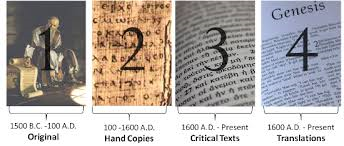
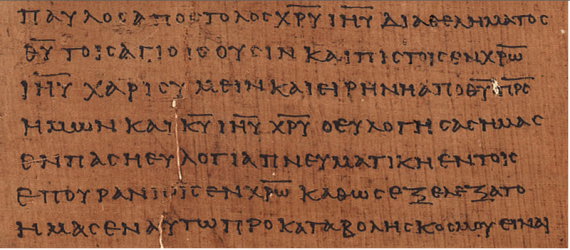
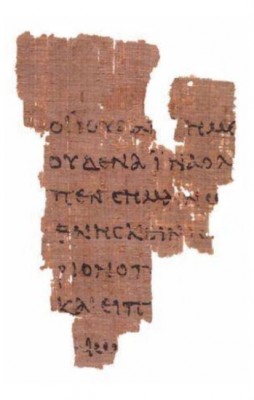 I always knew there were a lot of variants in the Greek manuscripts, but I had forgotten just how many there were. It seems almost every paragraph in the New Testament has a couple. Nevertheless, I sort of assumed that most scholars sort of agreed on what the “major” variants were.
I always knew there were a lot of variants in the Greek manuscripts, but I had forgotten just how many there were. It seems almost every paragraph in the New Testament has a couple. Nevertheless, I sort of assumed that most scholars sort of agreed on what the “major” variants were.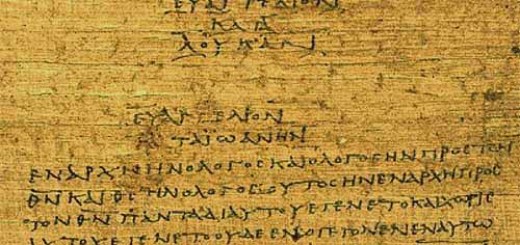





 This is not about the sanctity of God’s Word, but about the sanctity of God’s people … namely, ALL people.
This is not about the sanctity of God’s Word, but about the sanctity of God’s people … namely, ALL people.